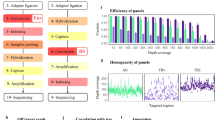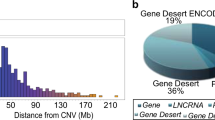Abstract
Allele-specific DNA methylation (ASM) is a hallmark of imprinted genes, but ASM in the larger nonimprinted fraction of the genome is less well characterized. Using methylation-sensitive SNP analysis (MSNP), we surveyed the human genome at 50K and 250K resolution, identifying ASM as recurrent genotype call conversions from heterozygosity to homozygosity when genomic DNAs were predigested with the methylation-sensitive restriction enzyme HpaII. Using independent assays, we confirmed ASM at 16 SNP-tagged loci distributed across various chromosomes. At 12 of these loci (75%), the ASM tracked strongly with the sequence of adjacent SNPs. Further analysis showed allele-specific mRNA expression at two loci from this methylation-based screen—the vanin and CYP2A6-CYP2A7 gene clusters—both implicated in traits of medical importance. This recurrent phenomenon of sequence-dependent ASM has practical implications for mapping and interpreting associations of noncoding SNPs and haplotypes with human phenotypes.
This is a preview of subscription content, access via your institution
Access options
Subscribe to this journal
Receive 12 print issues and online access
$209.00 per year
only $17.42 per issue
Buy this article
- Purchase on Springer Link
- Instant access to full article PDF
Prices may be subject to local taxes which are calculated during checkout



Similar content being viewed by others
Accession codes
References
Chandler, L.A., Ghazi, H., Jones, P.A., Boukamp, P. & Fusenig, N.E. Allele-specific methylation of the human c-Ha-ras-1 gene. Cell 50, 711–717 (1987).
Silva, A.J. & White, R. Inheritance of allelic blueprints for methylation patterns. Cell 54, 145–152 (1988).
Yamada, Y. et al. A comprehensive analysis of allelic methylation status of CpG islands on human chromosome 21q. Genome Res. 14, 247–266 (2004).
Yuan, E. et al. A single nucleotide polymorphism chip-based method for combined genetic and epigenetic profiling: validation in decitabine therapy and tumor/normal comparisons. Cancer Res. 66, 3443–3451 (2006).
Lin, M. et al. dChipSNP: significance curve and clustering of SNP-array-based loss-of-heterozygosity data. Bioinformatics 20, 1233–1240 (2004).
Boccaccio, I. et al. The human MAGEL2 gene and its mouse homologue are paternally expressed and mapped to the Prader-Willi region. Hum. Mol. Genet. 8, 2497–2505 (1999).
Lee, S. et al. Expression and imprinting of MAGEL2 suggest a role in Prader-willi syndrome and the homologous murine imprinting phenotype. Hum. Mol. Genet. 9, 1813–1819 (2000).
Saitoh, S. et al. Clinical spectrum and molecular diagnosis of Angelman and Prader-Willi syndrome patients with an imprinting mutation. Am. J. Med. Genet. 68, 195–206 (1997).
Tyndale, R.F. Genetics of alcohol and tobacco use in humans. Ann. Med. 35, 94–121 (2003).
Goring, H.H. et al. Discovery of expression QTLs using large-scale transcriptional profiling in human lymphocytes. Nat. Genet. 39, 1208–1216 (2007).
Gimelbrant, A., Hutchinson, J.N., Thompson, B.R. & Chess, A. Widespread monoallelic expression on human autosomes. Science 318, 1136–1140 (2007).
Ohlsson, R., Tycko, B. & Sapienza, C. Monoallelic expression: 'there can only be one'. Trends Genet. 14, 435–438 (1998).
Wang, J., Valo, Z., Smith, D. & Singer-Sam, J. Monoallelic expression of multiple genes in the CNS. PLoS ONE 2, e1293 (2007).
Chan, T.L. et al. Heritable germline epimutation of MSH2 in a family with hereditary nonpolyposis colorectal cancer. Nat. Genet. 38, 1178–1183 (2006).
Zogel, C. et al. Identification of cis- and trans-acting factors possibly modifying the risk of epimutations on chromosome 15. Eur. J. Hum. Genet. 14, 752–758 (2006).
Suter, C.M. & Martin, D.I. Inherited epimutation or a haplotypic basis for the propensity to silence? Nat. Genet. 39, 573; author reply 576 (2007).
Murrell, A. et al. An association between variants in the IGF2 gene and Beckwith-Wiedemann syndrome: interaction between genotype and epigenotype. Hum. Mol. Genet. 13, 247–255 (2004).
von Richter, O. et al. Polymorphic NF-Y dependent regulation of human nicotine C-oxidase (CYP2A6). Pharmacogenetics 14, 369–379 (2004).
Pitarque, M. et al. Identification of a single nucleotide polymorphism in the TATA box of the CYP2A6 gene: impairment of its promoter activity. Biochem. Biophys. Res. Commun. 284, 455–460 (2001).
Pitarque, M. et al. A nicotine C-oxidase gene (CYP2A6) polymorphism important for promoter activity. Hum. Mutat. 23, 258–266 (2004).
Cokus, S.J. et al. Shotgun bisulphite sequencing of the Arabidopsis genome reveals DNA methylation patterning. Nature 452, 215–219 (2008).
Acknowledgements
This work was supported by grants to B.T. from the US National Institutes of Health, the March of Dimes and the Leukemia and Lymphoma Society in collaboration with the Douglas Kroll Research Program.
Author information
Authors and Affiliations
Contributions
Study design: K.K. and B.T. MSNP, molecular validations and analysis of ASE: K.K., A.S., E.Y., J.K., L.J., E.H., K.L. and V.V.M. Bioinformatic analyses: E.H., M.M. and F.H. Statistical analyses: N.S. and F.H. Provision of biological samples: A.S., V.V.M., N.S., E.V. and B.T. Interpretation and writing the paper: K.K., N.S., E.V. and B.T.
Corresponding author
Supplementary information
Supplementary Text and Figures
Supplementary Figures 1–5 and Supplementary Tables 1–3 (PDF 1461 kb)
Rights and permissions
About this article
Cite this article
Kerkel, K., Spadola, A., Yuan, E. et al. Genomic surveys by methylation-sensitive SNP analysis identify sequence-dependent allele-specific DNA methylation. Nat Genet 40, 904–908 (2008). https://doi.org/10.1038/ng.174
Received:
Accepted:
Published:
Issue Date:
DOI: https://doi.org/10.1038/ng.174
This article is cited by
-
Will epigenetics ever be a biosocial science? A reply to Chiapperino and Paneni
Epigenetics Communications (2023)
-
Genes implicated by a methylome-wide schizophrenia study in neonatal blood show differential expression in adult brain samples
Molecular Psychiatry (2023)
-
Sequence terminus dependent PCR for site-specific mutation and modification detection
Nature Communications (2023)
-
Mapping methylation quantitative trait loci in cardiac tissues nominates risk loci and biological pathways in congenital heart disease
BMC Genomic Data (2021)
-
DAMEfinder: a method to detect differential allele-specific methylation
Epigenetics & Chromatin (2020)



